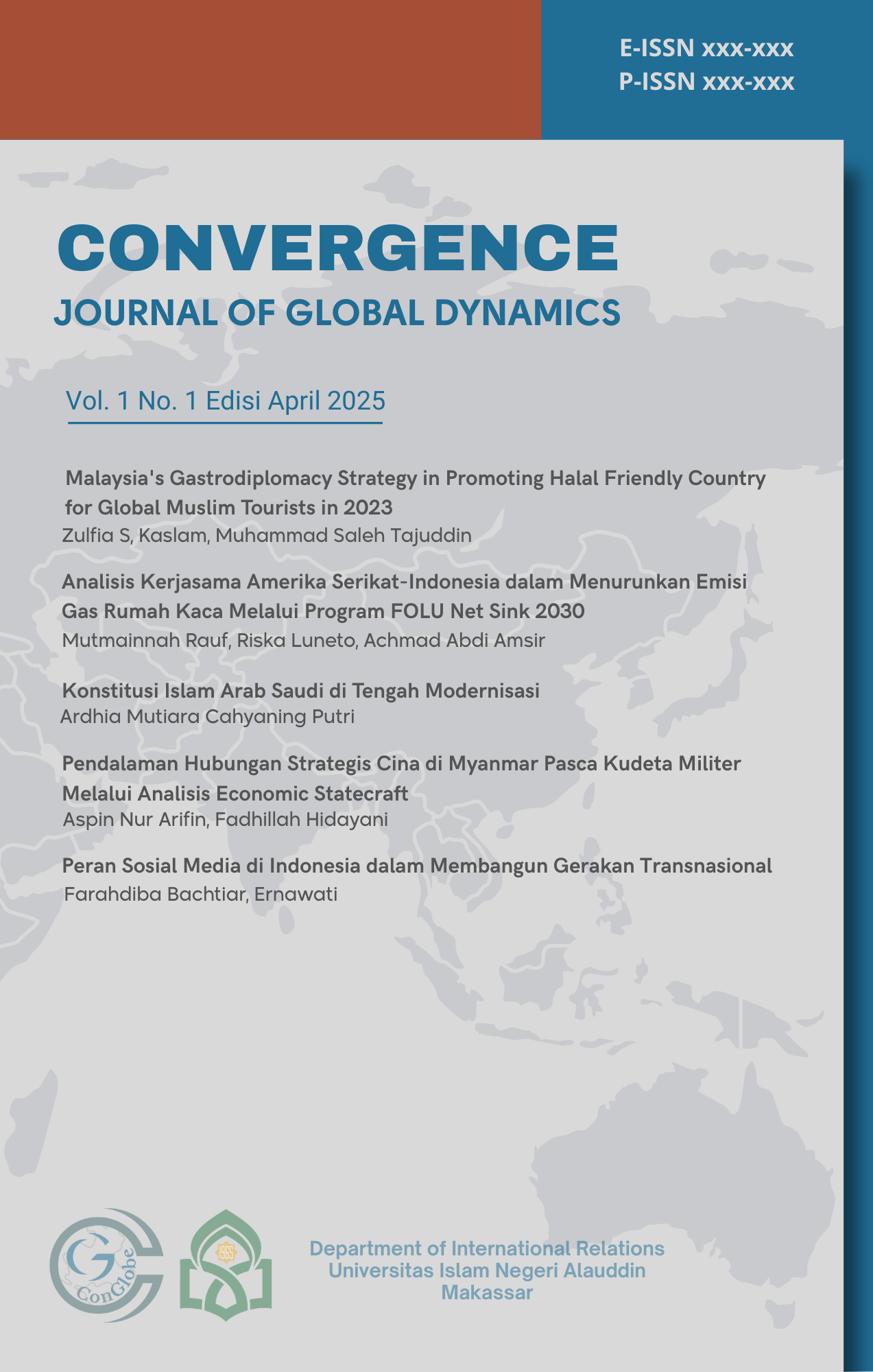Malaysia's Gastrodiplomacy Strategy in Promoting Halal Friendly Country for Global Muslim Tourists in 2023
Keywords:
halal certification, Malaysia, nation branding, Islamic tourism policy, soft power, culinary diplomacyAbstract
This study investigates how halal culinary branding and gastrodiplomacy contribute to national identity formation, tourism competitiveness, and international diplomacy, with a focus on Malaysia as a leading case in 2023. The research aims to evaluate how Islamic principles are embedded within national tourism strategies and how culinary initiatives shape perceptions and promote intercultural engagement. Using a qualitative descriptive-analytical approach, the study integrates document analysis of policy frameworks, literature on soft power and religious diplomacy, and secondary data from halal tourism campaigns, certification systems, and branding practices. The findings reveal that halal certification, when aligned with ethical stewardship and nation branding, significantly enhances trust among Muslim travelers and positions Malaysia favorably in global tourism indices. Culinary diplomacy events and digital influencer engagement serve as powerful platforms for promoting national identity, while halal standards offer robust indicators of food safety and cultural integrity. The study concludes that integrating religious values with culinary diplomacy strategies not only elevates national image but also promotes economic growth and cross-cultural understanding. These findings offer critical insights into the development of inclusive, ethically grounded, and sustainable Islamic tourism policies.
References
Abhari, N., Hasan, M., & Nordin, R. (2022). Muslim tourist perceptions on halal certification. Tourism and Hospitality Research, 22(4), 467–479.
Anggara, A., Ratnasari, R., & Osman, I. (2023). How store attribute affects customer experience, brand love and brand loyalty. Journal of Islamic Marketing, 14(11), 2980–3006.
Asa, R., & Azmi, F. (2017). Halal governance framework and religious rulings in Malaysia. Journal of Islamic Business and Ethics, 3(1), 13–25.
Bradshaw, C., Atkinson, S., & Doody, O. (2017). Employing a qualitative description approach in health care research. Global Qualitative Nursing Research, 4. https://doi.org/10.1177/2333393617742282
Chao, J. (2022). The visual politics of brand china: exceptional history and speculative future. Place Branding and Public Diplomacy, 19(3), 305–316.
Chapter Five: National Food in the International Context I—Gastrodiplomacy. (2022). In The Cultural Politics of Food. Routledge.
Dinnie, K., Melewar, T., Seidenfuss, K., & Musa, G. (2010). Nation branding and integrated marketing communications: an ASEAN perspective. International Marketing Review, 27(4), 388–403.
Fathun, L. (2023). IRS public diplomacy strategy of Indonesia: Case study Indomie gastrodiplomacy. Jurnal Asia Pacific Studies, 7(1), 1–10.
Gale, N., Heath, G., Cameron, E., Rashid, S., & Redwood, S. (2013). Using the framework method for the analysis of qualitative data in multi-disciplinary health research. BMC Medical Research Methodology, 13(1).
Hamidon, H. (2016). Halal certification in Malaysia: Organizational and procedural structure. Halal Journal, 3(1), 22–30.
Hariani, H., Mustofa, B., & Aziz, T. (2024). Halal food quality and satisfaction: Evidence from Indonesia. Jurnal Manajemen Pariwisata, 15(1), 55–69.
He, L., Rong-dang, W., & Jiang, M. (2019). Evaluating the effectiveness of China’s nation branding with data from social media. Global Media and China, 5(1), 3–21.




